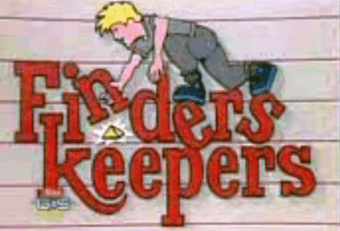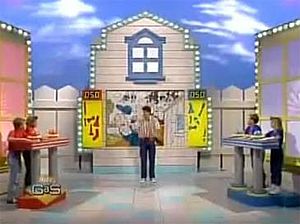Finders Keepers (American game show) facts for kids
Quick facts for kids Finders Keepers |
|
|---|---|

Intro title for Finders Keepers.
|
|
| Created by | Geoffrey Darby Bonni Grossberg Michael Klinghoffer Neil Krupnick Dee LaDuke |
| Presented by | Wesley Eure (Nickelodeon) Larry Toffler (Syndication) |
| Theme music composer | Edd Kalehoff |
| Country of origin | United States |
| No. of episodes | 195 (Nickelodeon: 130; syndication: 65) |
| Production | |
| Production location(s) | Philadelphia, Pennsylvania (first two seasons) Los Angeles, California (syndication) |
| Running time | 30 minutes (including commercials) |
| Production company(s) | Games Productions Nickelodeon Fox Television Stations Productions (1988-1989) |
| Distributor | Viacom Enterprises (1988-1989) |
| Release | |
| Original network | Nickelodeon (1987–88) Syndicated (1988–89) |
| Original release | November 2, 1987 – March 10, 1989 |
Finders Keepers is a children's game show that debuted on Nickelodeon in 1987 and later aired in first-run syndication starting in 1988. The show featured two teams of two children attempting to find hidden objects in different rooms of a house.
The Nickelodeon version premiered on November 2, 1987, and was hosted by Wesley Eure. Following this version's cancellation, Larry Toffler hosted a syndicated version that premiered on September 12, 1988.
Contents
Gameplay
Main Game
The main game was played in two rounds, each with two halves. The first half of each round involved finding hidden pictures in a complex drawing, and the second half involved ransacking rooms in a large house built on-stage.
Hidden Pictures round
In the first half of each round, the object for the teams was to find hidden pictures drawn into a larger picture based on clues given by the host. On the Nickelodeon series, the picture was displayed on a telestrator and the team used a light pen to circle the object. On the syndicated series the picture was displayed on the game board with plastic laminate stickers similar to Colorforms representing the objects, and the team had to run to the board and stick a laminate to the picture to show where the hidden object was.
Each correct item located earned $25 for the team and an opportunity to search one of four rooms in the house for that round. During the first half of the Nickelodeon series the players chose the rooms they wanted to search, but this was later changed so that each hidden object found awarded the opportunity to search a specific room.
Each picture had a maximum of six objects hidden within it. In the first half of the Nickelodeon series, an incorrect answer meant a room would go unclaimed. For the subsequent episodes and syndicated series, the round was played until all four rooms were claimed or all six clues were played
Searching the house
The house consisted of eight rooms that could be whimsical versions of traditional rooms in a typical home (e.g., a living room, a bathroom, a den or a kitchen), or complete fantasy rooms, such as "Sherlock's Study," "Ali-Baba's bathroom", a sewer (which contained a pool of water), Tarzan's tree house, a pastry shop, or "Frankenstein's laboratory."
In each room, the host read a clue describing an object hidden within that room. The team had 30 seconds to find the object, and were given one chance to show it to the host once found. Each room in this round was worth $50, which went to the team if they found the object in the room. If the team either failed to find the correct object or showed an incorrect one to the host, the opposing team won the money.
Rooms were frequently set up with distractions to hinder the teams' searches of finding the object, such as ping-pong balls falling onto them from cabinets or the ceiling, sprays of water or confetti, and (in later episodes) entire shelves collapsing.
Round two
The process repeated with a second hidden pictures round and set of rooms to search. The dollar values increased to $75 for finding a correct hidden picture and $100 for successfully finding a hidden object in a room.
One of the rooms in round two was the "Instant Prize Room". If a team was in the room, a bell would go off and the lights in the room would flash to indicate this. If they managed to find the hidden object in the Instant Prize Room, both teammates won a bonus prize in addition to the $100 for finding the object; the prize could only be claimed by the team in the Instant Prize Room.
The team with the most money at the end of this round won the game and advanced to the Room to Room Romp. Both teams kept all money earned, the losing team receiving consolation prizes.
Tiebreaker
In the event that both teams were tied at the end of the second round, everyone went back to the play area and a shortened Hidden Pictures round was played. The first team to find two objects in the picture won.
Room-to-Room Romp
In the Room-to-Room Romp, the winning team had 90 seconds to find a hidden object in each of six rooms, in a sequence given to them before the round began. All six objects had tags attached, with each of the first five tags directing them to the next room and giving a clue for the object hidden there.
The team won a prize for each object found, increasing in value to a grand prize for getting through all six rooms within the time limit.


